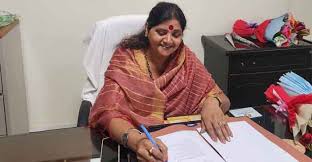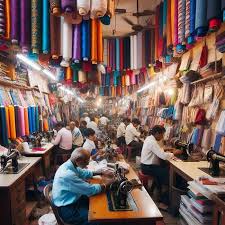The controversial directives of the Uttar Pradesh State Women’s Commission (UPSWC), intended to bolster women’s safety, have raised the hackles of women activists and organisations besides ordinary citizens, who see them as retrogressive. A report by Mudit Mathur

The Uttar Pradesh government faces a tricky situation in enforcing the latest gender-discriminatory directives issued by the Uttar Pradesh State Women’s Commission (UPSWC). The commission recommended controversial steps ostensibly to provide safety to women at large. These include barring male tailors from taking women’s measurements and restricting male trainers from instructing women in gyms and yoga sessions. The commission also suggested deploying women makeup artists instead of men in beauty parlours.
The directives of the UPSWC have sparked a sharp debate among progressive women activists and organisations, who viewed such extra-constitutional initiatives as a violation of the spirit of the Indian Constitution, which prohibits discrimination based on religion, race, caste, sex, or place of birth.
These directives directly conflict with citizens’ fundamental rights, which guarantee the freedom to practise any profession or pursue any occupation, trade, or business of choice. The state government has yet to implement the UPSWC’s recommended directives and is currently assessing their feasibility
The UPSWC headed by chairperson Babita Chauhan had communicated its decisions to the state’s chief secretary Manoj Kumar Singh for implementation via vide letter dated 28th October, recommending the engagement of female security personnel on school buses and hiring female staff in women’s clothing stores to enhance security for women in public and commercial spaces.

The Commission has proposed the installation of CCTV cameras in school buses, beauty parlours, gyms, yoga centres, and drama and dance schools. Police verification of all male employees in these establishments is also required to be done. Letters regarding the proposals have been sent to district magistrates across the state of Uttar Pradesh to encourage compliance and raise awareness.
These measures were discussed and resolved at a recent meeting of UPSWC in Lucknow following recent high-profile incidents, including a case in Kanpur where a male gym trainer allegedly murdered his client, Ekta Gupta, wife of a prominent Kanpur businessman, and buried her near the premises of the Kanpur District Magistrate’s residence.
Boutiques and beauty parlours were also highlighted as areas of concern in the meeting. “In boutiques, incidents of inappropriate touch by male tailors are common. Female staff should take women’s measurements to save them from any such embarrassment. Similarly, in beauty parlours, male beauticians working on bridal make-up and dressing often make customers uncomfortable,” the members stressed.
“There have been increasing complaints of ‘bad touch’ by male trainers in gyms and in women’s boutiques where tailors who take measurements are mostly male,” said Babita Chauhan, chairperson of the commission while justifying the decision. “What we are saying is that it isn’t a problem if the tailor is male but only women should take measurements,” she emphasised.
The commission also visualizes that this shift would help create more employment opportunities for women, though it acknowledges that training and hiring may take time to implement. The directives seek to ensure a more comfortable environment for women by limiting men’s roles in certain professions where physical proximity is required.
The approach of the commission has sparked a debate with many wondering if instead of “isolating men”, the focus should have been on “empowering women. “There is a difference between sensitising men and isolating them,” said Lucknow-based Niti, who works on women’s issues.
The commission’s approach has sparked debate, with many suggesting that the focus should be on ’empowering women’ rather than ‘isolating men.’ ‘There is a difference between sensitising men and isolating them,’ said Niti, a Lucknow-based advocate for women’s issues.
Former acting Vice-Chancellor of Lucknow University, teacher and activist Roop Rekha Verma, said, “There cannot be a more stupid idea than this, because what is required is to create mindset among the public that we are not so different and so exclusive human beings as we are seen by each other.” “We are human beings and citizens in the same sense, and therefore this ghettoisation that only women will speak to women, only women will cut the hair of women doesn’t make sense. This sort of exclusive separation between boys and girls is the main reason behind the issues we face today,” she opined.
Madhu Garg, national joint secretary of AIDWA (All India Democratic Women’s Association), said, “This is not the correct thought process, and is done by those with a narrow mindset. Such actions risk jeopardising the jobs of hundreds of people.” “Generally, it is seen that women themselves give their measurements to the tailors. This is not a big issue. If the UPSWC wants to do anything, then it should stop the rape and murder of women. They are unable to do anything about this, and are speaking like this on petty issues,” Garg added.
“We consider this type of directive of the Women’s Commission as an assault on the employment of Muslim minorities who are largely engaged in tailoring and embroidery artworks. If a woman goes to the police station with a complaint of such harassment, the police normally do not register an FIR so what is the use of such an absurd order? This is an attack on a community. This decision is also against the constitution, as it also restricts the right to choose employment. The government must intervene and withdraw it immediately,” said noted writer and women’s rights activist Naish Hasan.
Samajwadi Party MLA Ragini Sonkar (Machhlishahr, Jaunpur) believed that it should be left to individuals to decide which store or gym they want to go to. “I don’t think this decision is justified as it should be left to an individual to decide whether one prefers a male or a female to attend to her. It is a matter of choice,” she said. “We are okay with the proposal about women’s presence being mandatory at shops selling women’s garments and at tailoring shops. But then, ultimately, it boils down to an individual’s choice and this can’t be limited to a particular sex,” Sonkar remarked.
After her contentious recommendations attracted severe criticism, the chairperson, Babita Chauhan, explained through the media that her suggestions weren’t aimed at forcing anyone to take services from any particular gender. “I am not telling women that you take services at gyms or boutiques only from women. What I am saying is that I am all for providing options and leaving it to women to choose whether she is more comfortable having men or women around.”












